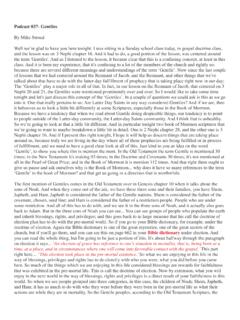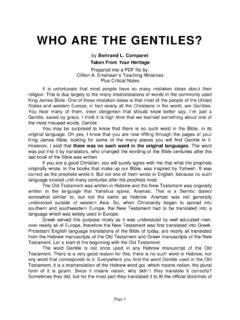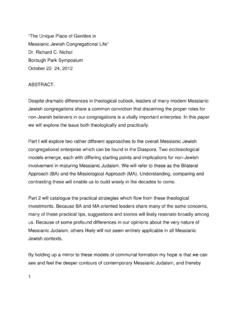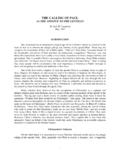Transcription of Salvation of Gentile and Jew - biblical studies center
1 Salvation of Gentile and Jew 1 Salvation of Gentile and Jew The Eschatological Significance of Israel s Future Restoration by Tim Gallant Introduction Some years ago, during my seminary career, I wrote an extensive paper on Romans In that paper, I defended the position that Paul anticipates a widespread turning of Israel to Christ prior to the Second Coming. I dealt extensively with the alternative views known to me. These included the simple the Church is Israel view (often associated somewhat misleadingly with John Calvin); the view that Paul is affirming a perpetual remnant of believing Jews (advocated by Hoeksema, Hendriksen, and others); along with the view I espoused.
2 In the intervening years, I have remained satisfied with my exegesis of Romans 11. Nonetheless, there have been two developments which have led me to write further on the subject: 1) new understanding regarding the structure of Paul s underlying logic; and 2) awareness of a fourth alternative, in the form of the preterist reading of Romans 11 put forward by James B. It should therefore be understood that this paper is intended to be complementary to my earlier work. Because there is such extensive argumentation available in All Israel, I have not deemed it necessary to reproduce much of the argument here.
3 What I do wish to accomplish in this essay, primarily, is to interact with Jordan s thesis, and along the way explore the further understanding at which I have arrived in the intervening period. Jordan s Preterist Reading James Jordan s position, in a nutshell, summarizes into two theses: 1) the Salvation of all Israel mentioned by Paul in Romans occurred with a widespread conversion of Jews just prior to the fall of Jerusalem in AD 70; and 2) the post-AD 70 reality is that there is no special place whatsoever for non-Christian Jews. In fact, as far as anything meaningful on a biblical level, there really is no such thing as Israel, except within the Christian Church, which itself is the real Israel.
4 To demonstrate this position, Jordan argues the following:3 1. Romans 11 is the only place in the New Testament where a future conversion of the Jews is Nowhere else is anything said about a future conversion 1 All Israel: The Saved in Romans Now available on the internet at: 2 The Future of Israel Reconsidered: Another Look at Romans 11. biblical Horizons Occasional Paper No. 18. (Niceville, FL: biblical Horizons, 1994) 3 I am not here attempting to be exhaustive, but to provide a fair representation of the major points Jordan makes in defense of his position.
5 Salvation of Gentile and Jew 2 of the Jews (1-2). The implicit thought is that the usual interpretation of the chapter makes the chapter anomalous. 2. As one committed to preterism, Jordan thinks that most of the predictions in the New Testament concern the destruction of Jerusalem in AD 70 (3). 3. The Jews were never a strictly ethnic entity; rather their identity derived from a covenantal arrangement, and in fact, the nation consisted of many (an overwhelming majority, Jordan suggests) that had no Abrahamic bloodlines at all (4-5). 4. Correspondingly, the new covenant order is with the Church, just as previously Hebrews gave way to Israel, which in turn gave way to Jews, in successive dispensations of God s covenantal economy.
6 Meaning: the Church is it. 5. There was a transitional period from AD 30-70, within which the old Jew- Gentile order gave way to the new order, a new order in which there is no Jew nor Gentile , since all are one in Christ Jesus. This transitional period, as indicated by its 40 year length, was a wilderness period. By AD 70, it was time to enter the promised land, and the old Jewish people ceased to exist, being transformed into Christians, their new name (6). 6. Paul s no Jew or Gentile theology undercuts any notion of a special future for Israel. The whole point of Paul s gospel mystery is that in Christ there is no longer any distinction, as there was in the Old Covenant, between priestly Israelite and non-priestly God-fearing Thus, the meaning of the mystery runs against any notion of a continuing distinction between Jew and Gentile (9).
7 7. Paul s motivation in evangelizing gentiles is to provoke the Jews to jealousy. Jordan suggests this only makes sense for the first-century situation, where Jews were still steeped in the Old Testament promises. Modern Christians cannot provoke modern Jews to jealousy because they do not have what Modern Jews Talmudic Jews are looking for a completely different kind of kingdom (9). Modern Jews are not in the least provoked by the fact that non-Jews believe the Gospel. Modern Jews get angry with [when?] Jews convert, not when gentiles do (19). Response I have a great deal of respect for James Jordan, and I am happy to recommend his contributions to the Church s understanding of Scripture.
8 Moreover, it is to be conceded that there are many compelling aspects to his thesis. It has the attraction of providing a rather simple solution to some thorny problems not least, the issue of how there can be some sort of continuing covenantal status for Israel if (in general) it is apostate, and especially since the Church is the one institution with which God is now dealing. Nonetheless, I must confess that there are some features here which do not quite ring true for me, and I do not find his position compelling. It is not possible to give equal treatment to every matter that Jordan raises, but I do hope to give greater weight to the weightier matters, which will (I hope) help us to keep things in perspective.
9 Salvation of Gentile and Jew 3 1. Is Romans 11 an Anomaly? It is on this very first point that I wish to focus my attention, because if the passage is not such a sore thumb, then it will be all the less possible for us to adopt (what I must call) an idiosyncratic reading. The precondition for the eschaton in Romans 11 This was, in truth, my weak point in my earlier paper, because I had written in a brief course of time and focused upon one chapter. Moreover, there was one element in Romans 11 that I had not grasped (and that element makes its presence felt at least three times). It was only after reading Arland Hultgren s Paul s Gospel and Mission4 and Terence L.
10 Donaldson s Paul and the Gentiles5 that I was triggered to do further reflection. And that further reflection opened up another text that brought things together very clearly. In Romans 11, at least four times Paul asserts that the Salvation of the gentiles has occurred precisely because of Israel s recalcitrance: : through their Salvation has come to the gentiles . : their fall is riches for the world, and their failure riches for the : their being cast away is the reconciling of the : The gentiles have now obtained mercy through their Why is it said that Salvation comes to the gentiles through Israel s fall?









